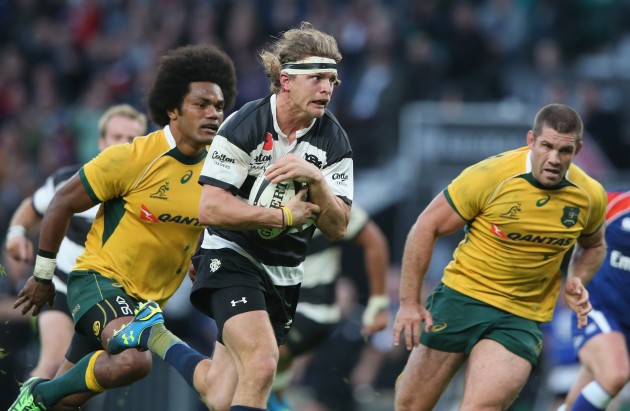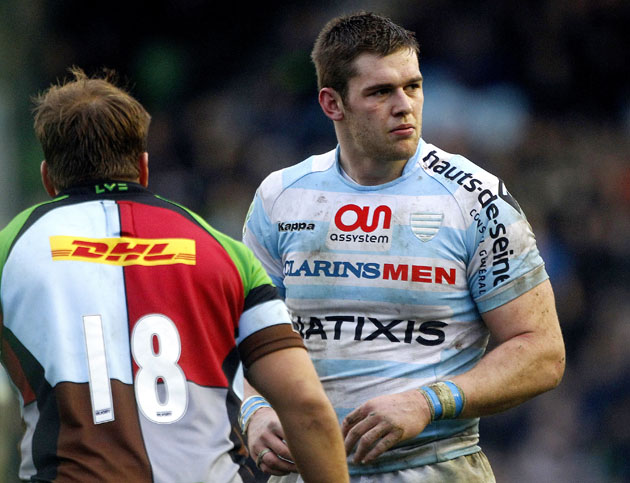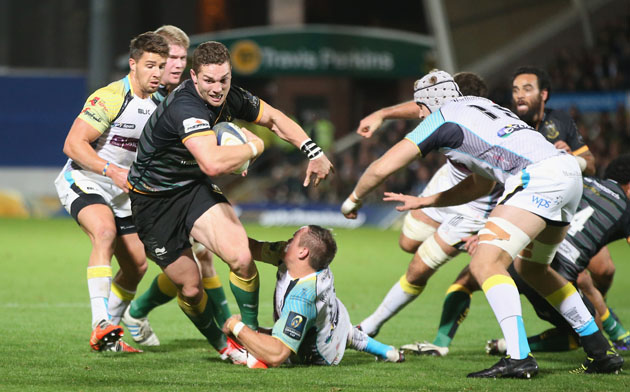The Barbarians live on, Dan Lydiate returns from France, rugby's US expansion and Gareth Davies' new role as WRU chairman is all covered in October's wrap
Australia v Barbarians. Take a bow
I feel sorry for whichever producer was tasked with producing the highlights package for the Barbarians v Australia game. Cutting that down to 15 minutes must have been a nightmare. It was pure entertainment and a wonderful antidote to the paranoid, stifling game that test level rugby can become. Between both sides the ball was passed 417 times. To put that in perspective, the last time Wales played South Africa, both teams managed just 237 passes combined. It was a glorious exhibition where hands took precedence over feet with Australia kicking the ball just four times. There were 37 clean breaks, 57 defenders beaten and 50 offloads – it was like watching 15 year-old boys ‘preening when their girlfriend’s come to watch them play down the local rugby club. But above all it showed that rugby, when played with the right mind-set, can compete in the entertainment stakes with any sport in the world.
Dan Lydiate released early
October saw Dan Lydiate released from his contract with Racing Metro. It was no surprise as Lydiate had only played four hours of competitive rugby for Racing Metro this season. Lydiate’s time in French rugby has been torrid. In fact Welsh-French entente cordiale hasn’t reached such an awkward low since my ill-fated pen-pal relationship with a girl from La Rochelle in 1987 – she wrote to me 12 times, I didn’t RSVP once. Anyway, I digress, in truth, The British Lion and former Six Nations Player of the Tournament wasn’t suited to the Top 14. This is a league that values versatile, almost generic, back row forwards such as Steffon Armitage and Juan Martín Fernandez Lobbe – players who can play two or even three positions in the backrow. It almost makes you wonder if Racing Metro’s scouts even watched Lydiate’s highlights showreel before they signed him. Lydiate is a highly specialised six, the Dennis Rodman of rugby, a player who has perfected his defensive role to a level that it almost redefined the ‘tackle-line’. Lydiate hasn’t yet declared for which team he will now play, largely due to confusion regarding his suitability for a dual-contract, and which Welsh region has the right to claim him. Either way, Lydiate shouldn’t be short of offers.
Northampton. Genuine contenders for Europe
Last month’s European Rugby Champions Cup (please Lord find a shortened version for this tournament) saw the best in the Aviva Premiership take on the best in the Guinness Pro 12. The Ospreys had entered the fixture unbeaten in the Pro 12, but this season Northampton Saints represent a significant hike in quality. Even the in-form Dan Biggar, Rhys Webb and Alun-Wyn Jones struggled to make influence the game at Franklin’s Garden. The gulf between the two sides was particularly evident at the breakdown where Tom Wood, Samu Manoa and Calum Clark were highly effective – Justin Tipuric was uncharacteristically shut out of the game. However, special praise must be reserved for George North who scored four tries. He actually scored more points than 13 of the teams playing in that weekend’s Rugby Champions Cup. It’s so encouraging to see North being utilised so effectively. The Saints backline regularly play him off the 13 or 15 instead of forcing him to carry senselessly into backrow forwards in the 9 and 10 channel. Make no mistake, Northampton are the real deal this season.
Balance at the WRU
October saw Gareth Davies appointed as the new Chairman of the WRU. It appears a prudent decision. Not only does Davies have the elite rugby CV required, his commercial credentials are equally reassuring – the former CEO of the Newport Gwent Dragons has also held senior roles within CBI Wales, BBC Wales, S4C, the Sports Council for Wales and the Royal Mail. The appointment of Davies should be seen as a positive move for Welsh rugby as a whole, but particularly the four Welsh regions (who have recently rebranded as Pro Rugby Wales). Davies’ arrival represents a more equitable power shift from the WRU towards the regions. In recent times it has felt as though the WRU were sitting around the boardroom table, in luxurious soft leather upholstered chairs, whilst the regions were asked to sit on those slightly worn chairs you retrieve from the garage when your entire family nip around unannounced. This isn’t to suggest that Davies will offer any bias, he won’t, he isn’t that sort of man, but he will ensure that any disagreements are met with a fair and balanced approach for all parties. That can only be good for Welsh rugby.
Rugby tries to crack the USA
The past week saw the All Blacks travel to the USA to take on the Eagles. The move was met by some with cynicism, sniggers and talk of selling out for a few dollars, especially with Sonny Bill Williams and Dan Carter back in tow. But those sentiments are way off the mark. Rugby needs to grow both its commercial and participation numbers. Whilst the rugby public would love to believe that our sport is the premier game in the world, most of the world doesn’t even know rugby exists. Rugby’s relatively small target audience has big consequences outside of the slush funds that pour through the AVIVA Premiership and Top 14 – Welsh and Australian rugby being just two examples of cash shortfalls. Some think that the expansion of rugby into new countries, particularly the playing of domestic club fixtures overseas, will be detrimental to traditional rugby playing nations. But it won’t, quite the opposite, the long-term expansion of the game will benefit all. New markets bring new audiences, new audiences bring TV and TV brings sponsors. American dollars could be a game-changer for many in rugby – such expansion could mean that the first sponsor of the Millennium Stadium is an American company seeking to expand in Europe. Rugby needs to embrace new markets and revenue streams – every other successful organisation does and rugby should be no different.








